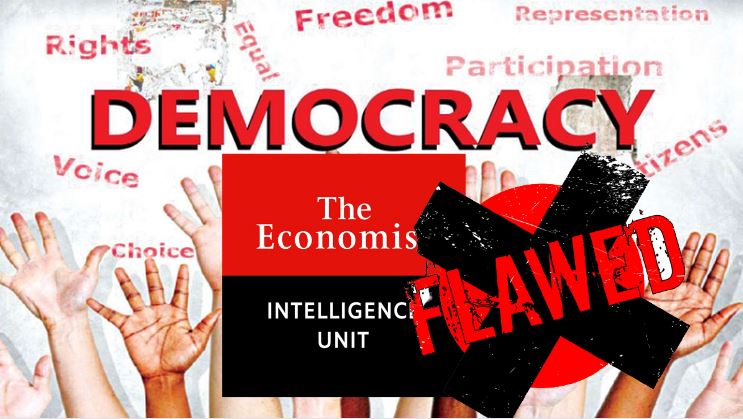- EIU ranks India at 46th position in their democracy index and calls it a flawed democracy.
- According to the EIU report, Modi government’s withdrawal of farm laws and BJP losing elections are signs of good health of democracy.
- EIU ranking is not accurate as the way in which it calculates the index lacks transparency.
Economist is one of those magazines, that still has an iota of credibility left in journalism. Now, it turns out that their methodologies have evolved in a negative direction. Recently, they have called India a flawed democracy in their latest ‘rankings’.
‘India is flawed’-Economist
India is ranked as the 46th most democratic nation in the world by Economist Intelligence Unit (EIU). India’s cumulative score was 6.91. This put India under the flawed democracy category of the ranking. Interestingly, the ranking says that India is in the same category as USA, which is facing biggest allegation of voter fraud in history.
The democracy index by EIU is one of the most cited indices in the world. It tries to measure the extent to which a country is democratic in its functioning. A total of 167 countries come under its purview, out of which 164 are recognised by United Nations.
BJP’s loss is a sign of accountability
This years’ report about India made a specific reference to farmers’ protests and BJP. The report seems to suggest that the withdrawal of farm laws is a victory of democracy. Moreover, it also cited BJP’s loss in elections to assert that Indian democratic setup is accountable in nature.
The report reads, “In India, year-long protests by farmers eventually forced the government to repeal the farm laws that it had introduced in 2020. The victory of the protesters, as well as some election defeats for the ruling Bharatiya Janata Party, showed that there are mechanisms and institutions in place to allow government accountability to the electorate between national elections.”
Up until now, things look positive for India. However, in its later comment, magazine seemed to play into the hands of anti-India propagandists. Without referencing any data, Economist writes, “However, the government’s failure to crack down on the persecution of religious and other minorities by Hindu nationalists continues to weigh on India’s democracy score, which has declined significantly in recent years”
Economist’s method to calculate index is not very reliable
This contradiction in the Economist’s viewpoint traces its origin to the method in which they compile their index. It asks ‘experts’ (we will decode them later in this article) to answer 60 questions divided into 5 categories. These categories are electoral process and pluralism, civil liberties, functioning of government, political participation and political culture.
Based on answers given by these ‘experts’, EIU assigns a specific number, which can be 0, 0.5 or 1. The scores obtained by a country in the above 5 categories are then added. The total score reflects a country’s average score over these 5 parameters.
Read more: The Economist starts the year with a heavy dose of “Hinduphobia”
Objective data is not a criteria, but perception is
The line of questioning is mostly subjective in nature. Its questionnaire has questions like
(PC: WIKIPEDIA)
Now, if an expert(or anyone) answers it, then he/she can not give an unbiased opinion. If he/she is residing in Bihar in 1990, then they would say that elections are not free and fair. Similarly, any one can not claim that voters are secure in the wake of Bengal assembly elections 2021. However, if they are assessing reports of different states at different time-frame, they won’t have a problem providing affirmative answers to above questions.
Read more: Calcutta HC warns Times of India against publishing misleading reports on Bengal post-poll violence
Economist has cleverly avoided any objective measure of democracy. One of the main purposes of democracy is to raise the economic and social living standard of common people. But, for the ‘Economist’, it’s not a criterion to judge a democracy. No questions related to Economic living standards were added in the questionnaire.
Economic living standards can actually be measured in numbers, while the questions in use by EIU are subject to public opinion and attitude, which are often vague and tough to verify. Basically, the questioning turns the democracy index into ‘perception of democracy index’.
Opaque experts
While EIU claims that it has experts sitting in its panel, it never reveals their identities. Since assigning scores is a closed-door process, nobody knows what lies behind the curtains. It is for anyone’s guess that those supposedly experts could be renowned academicians or in-house experts of Economist. Logically, it can also be said that there are no experts and the magazine just asks a flurry of questions to its staff and publishes their opinions as ‘expert opinions’. Up until they bring transparency, doors of speculations are always open.
Peter Tasker, an investment analyst has criticised the anonymity of experts in the following words, “Who are these experts? Nobody knows. Wikipedia dryly notes that the report does not reveal their number, nationality, credentials or even field of expertise.”
Transparency is one of the permanent and sought-after features of democracy. It’s ironic to see that an index that measures democracy is not transparent in itself.
